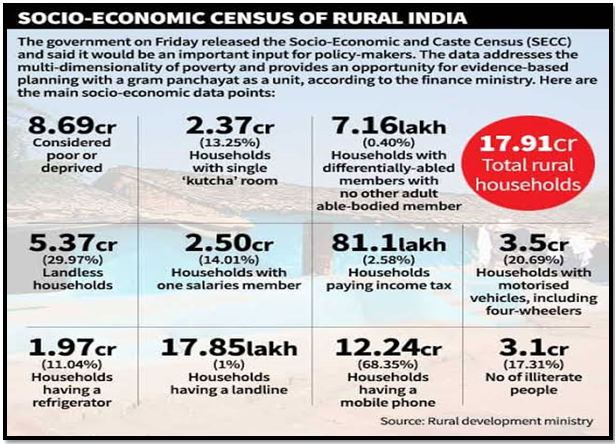SHOULD RESERVATION IN JOBS ONLY BE PROPORTIONAL TO POPULATION?
Syllabus:
GS 2:
- Government Policies and Interventions for Development in various sectors and Issues arising out of their Design and Implementation.
- Welfare Schemes for Vulnerable Sections of the population by the Centre and States
Why in the News?
The article is in the news due to ongoing debates about the fairness and constitutionality of proportional representation in job reservations, highlighted by Opposition’s campaign.. slogan “Jitni abadi, utna haq,” and the contrasting viewpoints of prominent scholars like Sukhadeo Thorat and Sudheendra Kulkarni.
Source: HT
Context and Debate
- Opposition’s Slogan: Rahul Gandhi’s campaign slogan “Jitni abadi, utna haq” suggests that rights and reservations should be proportional to a group’s population.
- Prime Minister’s Criticism: The Prime Minister criticized this slogan, stating it contradicts the spirit of the Constitution.
- Historical Usage: This slogan has roots in India’s social justice politics, previously used by Kanshi Ram and others.
- Constitutional Concerns: Critics argue that proportional representation in reservations contradicts constitutional principles.
- Debate Dynamics: Sukhadeo Thorat and Sudheendra Kulkarni explore these issues, moderated by Abhinay Lakshman, highlighting both historical and contemporary perspectives.
Historical Context of the Slogan
- Historical Roots: The slogan has been part of India’s social justice discourse, used by figures like Kanshi Ram and influenced by colonial policies.
- Caste Census Justification: A caste census is proposed to understand and address India’s diverse and exclusionary social structure.
- Policy Focus: India employs both individual and group-specific policies to address discrimination and ensure equal opportunities.
- Increased Demand for Group Policies: There has been a rise in demand for group-specific policies for SCs, STs, OBCs, and other marginalized groups.
- Data-Driven Policies: Accurate data on human development indicators is crucial for formulating effective group-specific policies.
| Constitutional Provisions Governing Reservation in India
Part XVI: Legislative Reservations Central and State Legislatures: Part XVI of the Constitution deals with the reservation of seats for Scheduled Castes (SC) and Scheduled Tribes (ST) in both central and state legislatures. Article 330 and 332: Specific representation is provided through reserved seats for SCs and STs in the Parliament (Article 330) and State Legislative Assemblies (Article 332). Articles 15(4) and 16(4): Government Services
Local Governance Reservations Article 243D: Ensures reservation of seats for SCs and STs in every Panchayat. Article 243T: Provides for reservation of seats for SCs and STs in every Municipality. Efficiency and Administration
|
Ambedkar and Proportional Representation
- Ambedkar’s Views: B.R. Ambedkar advocated for representation based on socioeconomic standing rather than mere population proportions.
- Historical Opposition: Ambedkar’s proposal for proportional representation was opposed by the Congress and not included in the Constitution.
- Affirmative Action: The Constitution introduced affirmative action for education and employment without the proportional representation principle.
- Unconstitutional Slogan: The concept of “Jitni abadi, utna haq” is deemed unconstitutional as it contradicts the principle of equality among citizens.
- Implementation Challenges: Proportional representation is impractical and could lead to social chaos due to existing imbalances among beneficiary groups.
Practical Considerations and Implementation Issues
- Challenges in Existing Reservations: There are significant difficulties in ensuring reservations even within current frameworks for SCs, STs, and OBCs.
- Sub-Categorization Demands: Beneficiary groups often demand sub-categorization to address perceived inequities in benefit distribution.
- Rohini Commission Findings: The Rohini Commission highlighted imbalances within beneficiary groups, further complicating implementation.
- Moral and Practical Frameworks: Policies should aim for justice, considering broader economic and social justice beyond just reservations.
- Holistic Approach Needed: A comprehensive approach to wealth and livelihood creation is necessary for meaningful social and economic justice.
Arguments for a Caste Census
- Purpose of Caste Census: A caste census aims to collect data on the population, socioeconomic, educational, and employment status of various groups.
- Transparency and Evidence-Based Policies: Accurate data can lead to transparent and fair policies, reducing reliance on political pressures.
- Understanding Progress and Backwardness: The census can reveal how certain castes have progressed or remain disadvantaged over time.
- Addressing Creamy Layer: The caste census can help identify and address the issue of the creamy layer among SCs and other groups.
- Holistic Data Collection: Beyond demographics, the census should gather information on ownership of resources, education levels, and instances of discrimination.
Way Forward / Moving Towards Social Justice
- Pro-Poor vs. Anti-Discrimination Policies: There is a need for both general pro-poor policies and specific anti-discrimination policies.
- Economic and Educational Empowerment: Policies should focus on empowering economically and educationally disadvantaged groups.
- Private Sector Reservations: Ambedkar advocated for reservations in the private sector where discrimination is more prevalent.
- Defining Fair Share: Fair share should be based on comprehensive socioeconomic and educational data rather than population alone.
- Purpose and Impact of Caste Census: A caste census should aim to provide a detailed understanding of group standings and inform just and effective policy-making.
Conclusion
The discussion reveals the complexities and controversies surrounding proportional representation in job reservations, emphasizing the need for a data-driven approach to ensure social justice. The debate underscores the importance of balancing constitutional principles with the demand for equitable representation of marginalized communities.
Source:The Hindu
Mains Practice Question
Discuss the merits and demerits of implementing job reservations based on population proportions. How can a caste census aid in formulating effective social justice policies in India? Evaluate the constitutional implications of such measures.
Associated Article:
https://universalinstitutions.com/socio-economic-caste-census-secc-2011/




